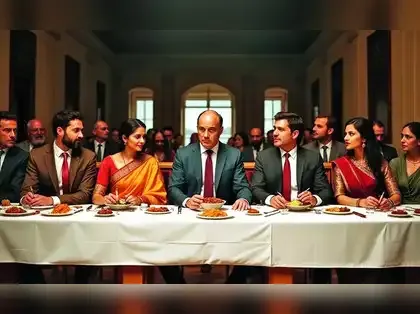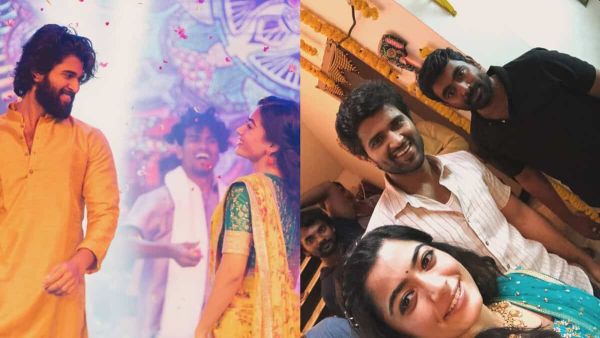There are few places better suited for reflecting on the grand decline of civilisation than a fine-dining restaurant with five courses, seven opinions, and no clear dessert of conclusion. The boardroom had moved to Indian Accent for dinner, following the successful end of a conference. The original agenda? The future of content, and Gen Z's fast-changing relationship with it.
But - as is tradition with gatherings of people seasoned in life and sufficiently marinated in media - the conversation swiftly veered to the real existential question of our times: 'What do these kids even want?'
Not that anyone asked it out loud. We began, as dignified veterans do, with mushroom chili cheese toast and a civilised chat about shrinking attention spans, and how algorithms now decide not just our content diets, but possibly even our romantic ones. But by the time the Rajasthani mangori curry arrived, we were knee-deep in familiar lament: Gen Z - the therapy-frequenting, feedback-seeking, dopamine-chasing generation that believes the universe owes them clarity, closure, and preferably a trigger warning.
There was near-unanimous agreement that we, the noble Gen X-Y sandwich generation, had it tougher. We survived dial-up internet, arranged marriages, and the trauma of never being praised for just showing up. We didn't have 'safe spaces' - unless you count the time-out corner after a solid scolding. We drank from garden hoses and waited 30 minutes to download a song. Our personalities were forged in buffering screens and budget constraints.
Then came the inevitable segue into relationships and resilience. Divorce rates, for instance. Officially just 1% in India - unless you live in a metro, in which case it's 20%, or more, if you count the couples who remain legally married but emotionally outsourced. And as one well-marinated board member noted between bites of goat cheese dahi vada, 'Men need to be more vulnerable.' A long pause followed, as if vulnerability might be available on the menu, but only after prior reservation.
Some reminded us that today's financially independent Indian woman is rewriting the script. 'Earlier, women compromised,' someone said with the wistfulness of a veteran soap opera viewer. 'Now they leave.' A beat. 'And take the dog.'
Talk turned to therapy, boundaries, emotional bandwidth, and our collective flammability in the age of AI. 'We're the generation that stayed married for the children,' someone offered. 'Gen Z won't even stay for Wi-Fi.'
By the time the crispy lotus root and avocado bonda made their appearance, we'd moved into the inevitable zone of self-diagnosis. We, too, were a little broken. We crave validation, but can't ask for it. We use work to dodge feelings. And we quietly believe that anyone under 30 who cries at work should probably be in sales.
The fifth course - a smoky, ambiguous creation that claimed to represent fusion - arrived like a metaphor for our collective midlife confusion. It became clear that this was no longer a dinner, but a group therapy session with silverware and shared delusion.
And then came the twist. As we clinked glasses and compared vitamin D levels, one question lingered: if Gen Z were at this table, what would they be complaining about?
Probably this: 'Look at these Gen X uncles and aunties cribbing about us again. Can't cry, can't quit, can't communicate. They romanticise trauma, glorify burnout, and think downloading a PDF is a personality trait.' Touche.
And so we left - well-fed, mildly enlightened, and deeply convinced that every generation thinks the next one is doing it all wrong, just with better lighting and worse attention spans. But perhaps that's our true legacy: the sacred art of dinner-table judgment, passed lovingly down, one course at a time.
But - as is tradition with gatherings of people seasoned in life and sufficiently marinated in media - the conversation swiftly veered to the real existential question of our times: 'What do these kids even want?'
Not that anyone asked it out loud. We began, as dignified veterans do, with mushroom chili cheese toast and a civilised chat about shrinking attention spans, and how algorithms now decide not just our content diets, but possibly even our romantic ones. But by the time the Rajasthani mangori curry arrived, we were knee-deep in familiar lament: Gen Z - the therapy-frequenting, feedback-seeking, dopamine-chasing generation that believes the universe owes them clarity, closure, and preferably a trigger warning.
There was near-unanimous agreement that we, the noble Gen X-Y sandwich generation, had it tougher. We survived dial-up internet, arranged marriages, and the trauma of never being praised for just showing up. We didn't have 'safe spaces' - unless you count the time-out corner after a solid scolding. We drank from garden hoses and waited 30 minutes to download a song. Our personalities were forged in buffering screens and budget constraints.
Then came the inevitable segue into relationships and resilience. Divorce rates, for instance. Officially just 1% in India - unless you live in a metro, in which case it's 20%, or more, if you count the couples who remain legally married but emotionally outsourced. And as one well-marinated board member noted between bites of goat cheese dahi vada, 'Men need to be more vulnerable.' A long pause followed, as if vulnerability might be available on the menu, but only after prior reservation.
Some reminded us that today's financially independent Indian woman is rewriting the script. 'Earlier, women compromised,' someone said with the wistfulness of a veteran soap opera viewer. 'Now they leave.' A beat. 'And take the dog.'
Talk turned to therapy, boundaries, emotional bandwidth, and our collective flammability in the age of AI. 'We're the generation that stayed married for the children,' someone offered. 'Gen Z won't even stay for Wi-Fi.'
By the time the crispy lotus root and avocado bonda made their appearance, we'd moved into the inevitable zone of self-diagnosis. We, too, were a little broken. We crave validation, but can't ask for it. We use work to dodge feelings. And we quietly believe that anyone under 30 who cries at work should probably be in sales.
The fifth course - a smoky, ambiguous creation that claimed to represent fusion - arrived like a metaphor for our collective midlife confusion. It became clear that this was no longer a dinner, but a group therapy session with silverware and shared delusion.
And then came the twist. As we clinked glasses and compared vitamin D levels, one question lingered: if Gen Z were at this table, what would they be complaining about?
Probably this: 'Look at these Gen X uncles and aunties cribbing about us again. Can't cry, can't quit, can't communicate. They romanticise trauma, glorify burnout, and think downloading a PDF is a personality trait.' Touche.
And so we left - well-fed, mildly enlightened, and deeply convinced that every generation thinks the next one is doing it all wrong, just with better lighting and worse attention spans. But perhaps that's our true legacy: the sacred art of dinner-table judgment, passed lovingly down, one course at a time.
(Disclaimer: The opinions expressed in this column are that of the writer. The facts and opinions expressed here do not reflect the views of www.economictimes.com.)









Sivakumar Sundaram
Sivakumar Sundaram is CEO (Publishing), BCCL.